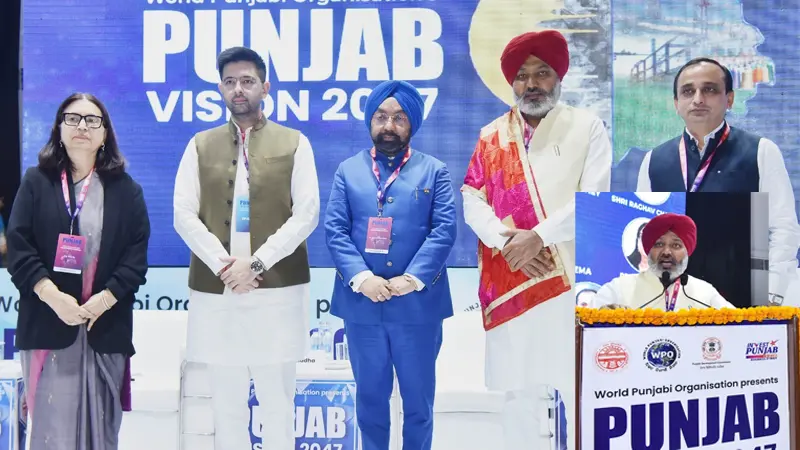Advocate Harpal Singh Cheema, Punjab's Finance, Planning, Excise, and Taxation Minister, on Tuesday stressed the importance of cooperative federalism and structural reforms by the Union Government. Speaking at the opening session of 'Punjab Vision: 2047' conclave organized by the World Punjabi Organization at Panjab University, Finance Minister Cheema saidn that the nation can only achieve its development goals for 2047 if all states progress together on the path of growth trajectory.
Addressing the gathering as the chief guest, Finance Minister Cheema said that India will celebrate 100 years of independence in 2047 and the Government of India must devise solutions that ensure no state is left behind in this journey. He focused on reforms in GST, agriculture, environment and industrial policies etc while highlighting the significant revenue losses faced by states due to the current GST regime. He pointed out that the GST system, being destination and consumer-based, has led to a substantial revenue loss for Punjab. He added that after implementing the Goods and Services Tax (GST) system, state's purchase tax was subsumed into the GST, resulting in an estimated annual revenue loss of Rs. 5,000 to Rs. 7,000 crore.
Finance Minister Cheema praised the 'Punjab Vision: 2047' initiative, stating that the discussions and insights from the conclave would help draft policies to ensure the state's overall development. He highlighted the Punjab government's proactive measures, including the Industrial Development Policy, Adventure Tourism Policy, Water Tourism Policy, Biofuels Policy etc. which were implemented to bring about the much-needed regulatory framework aimed at promotion of these sectors.
Reflecting on Punjab's historical contributions, Minister Cheema mentioned the state's pivotal role during the Green Revolution and the establishment of the Agricultural University in 1962, which significantly boosted the country's grain reserves. He acknowledged the setbacks faced during the challenging period post-1980 but expressed optimism about the state's current development trajectory under the Aam Aadmi Party's governance.
In his speech, Raghav Chadha, Member of Parliament (Rajya Sabha) outlined a visionary roadmap for Punjab in 2047, marking the 100th anniversary of India's independence. He envisaged a future where Punjab emerges as a leader in sustainable agriculture, economic diversification, education, green energy, infrastructure, and social equality.
MP Raghav Chadha highlighted ten critical areas that will form the foundation of this vision for Punjab in 2047: including First; Sustainable Agriculture and Environmental Resilience, Second; Economic Diversification and Industrial Growth, Third; Education, Skills, and Workforce Development, Fourth; Energy and Environmental Sustainability, Fifth; Infrastructure and Connectivity, Sixth; Governance, Social Equality, and Citizen Engagement, Seventh; Health, Sanitation, and Public Services, Eighth; Fiscal Strategy and Economic Stability, Ninth; Innovation, Entrepreneurship, and Global Connectivity, and Tenth; Disaster Resilience and Climate Adaptation. He emphasized that these ten areas are essential for creating a robust and forward-looking Punjab, ready to meet the challenges and opportunities of the future.
Earlier, Dr. Vikramjit Singh Sahney, Member of Parliament (Rajya Sabha) and International President of World Punjabi Organization, set the tone for 'Punjab Vision: 2047' Conclave, emphasizing its role as a catalyst for collaborative dialogue and in-depth discussions. He said that this two-day conclave's objective is to create a platform where diverse perspectives converge to shape Punjab's future. He said that by bringing together experts from various fields including government officials, industry leaders, academics, and civil society members, the event seeks to foster meaningful discussions, identify opportunities, and develop strategies for Punjab's progress toward inclusive, sustainable growth and development.
Renu Vig, Vice Chancellor of Panjab University, emphasized the pivotal role of educational institutions, particularly higher education, in driving Punjab's development. She also shed light on the pressing issue of young Punjabis migrating to other states or countries due to various factors. Prof. Y P Verma delivered the vote of thanks.
